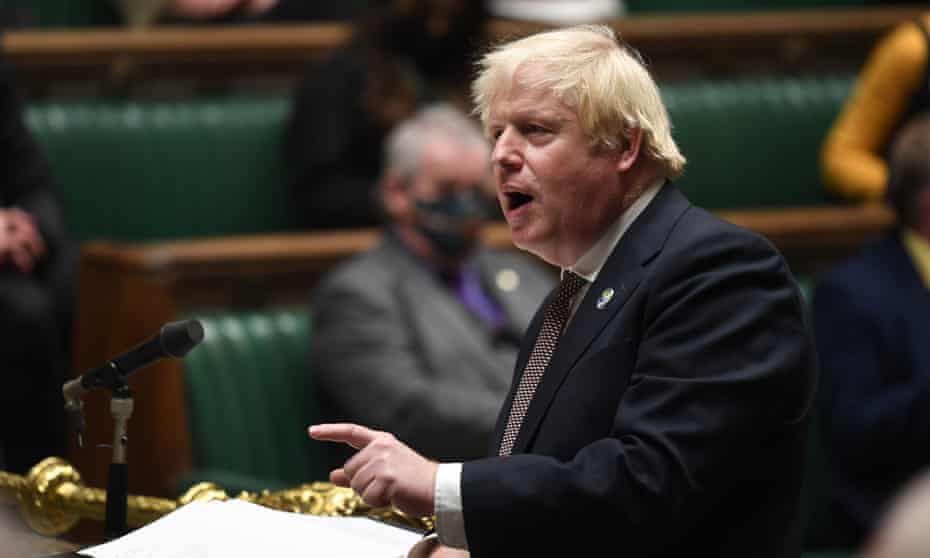Boris Johnson confirms that Cop26 went well – and was definitely in Glasgow

Tory benches were sparsely filled as PM addressed the Commons, though Geoffrey Cox was back

Boris Johnson did get one thing right in his Commons statement on Cop26. In the previous day’s press conference he had been adamant it had taken place in Edinburgh. Overnight he had been corrected and was now able to accurately locate the climate change summit as being in Glasgow. It was this kind of attention to detail that had made the conference such an outstanding success. Or at least the prime minister’s rose-tinted version of it.
Even so, the Conservative benches were noticeably less full than the opposition’s. Either most Tory MPs weren’t so convinced that Cop26 had been a triumph or they still haven’t forgiven Boris for making them look like mugs over the Owen Paterson vote. Or maybe they had got wind of the fact that Johnson had what sounded like the beginnings of a nasty cold – his voice was no more than a muted rasp – and didn’t want to take the chance of picking up his germs. Clearly the last two years have taught him nothing about the spread of infectious diseases.
One MP who was in the chamber, though, was the normally absent Geoffrey Cox, taking time off from working in the British Virgin Islands. Not that Geoff had anything to say. He was there to be seen, not heard. Something to write in his diary. Probably better that way. If he’d had to speak, he would have had to charge the Tory party double.
Not that Johnson appeared to notice his lack of support in the chamber, as his opening statement was pure mindless optimism. Bertie Booster on amphetamines. Cop26 hadn’t gone quite as badly as many – himself included – had feared, so it must therefore have gone amazingly well. In Boris’s narcissistic world everything is binary. It’s clearly never occurred to him that going on holiday only weeks before the summit was not a good look and that his time could have been better spent forcing agreements out of other countries.
This was a summit that had proved the doubters and the cynics wrong, he gasped. For the first time the whole world had called time on coal. Except they hadn’t. China and India had merely agreed to phase it down. There were no commitments to phasing it out. But Johnson heard what he wanted to hear. There would be less coal used, so that had to be good. Some progress had to be better than none. And some progress equated to Boris being a brilliant negotiator. Someone to whom both the UK and other countries should pay homage.
Understandably, Keir Starmer was rather more nuanced in his approach. Some progress was good, but the amount of progress wasn’t nearly enough. The dream of 1.5C was on life support. What had been agreed would merely reduce the temperature rise to 2.4C, which would still do irreparable damage to many countries. Only someone who thought that promises weren’t worth keeping could possibly say – as Johnson had done the previous day – that phasing down and phasing out were much the same. It didn’t even seem to have occurred to Boris to ask the Cop26 president, Alok Sharma, why he had cried at agreeing to that concession.
The Labour leader continued with the charge sheet. If the UK was serious about climate change, shouldn’t it be setting an example to countries who were dragging their heels? How come we had cut our overseas aid just months before the summit? Why were we opening a coalmine in Cumbria and the Cambo oilfield in the North Sea? Why had the GBP100bn a year for developing countries still not been met? Why had the trade deal with Australia ignored climate commitments? And why had the chancellor’s budget not mentioned the climate crisis even once?
“This is just pathetic,” said Bertie Booster. Though he wasn’t able to explain why, other than that it didn’t conform to his myopic vision of himself as a celebrated world leader. Though this did rather set the tone for the rest of the debate. Opposition MPs would press Johnson on points of fact and detail, reminding him that all he had achieved was a temporary stay of execution, while the home team MPs merely congratulated him on for once having done something at least partially right.
Apart from Edward Leigh, who couldn’t see what all the fuss was about. Who cared if a lot of people and other species died in 2050, what mattered was that his constituents weren’t inconvenienced right now. It’s a view, I suppose. The only consensus on both sides was that Sharma had done a good job as president. Sharma, sitting next to Johnson, nodded shyly. Much as he liked the applause, he would rather get out of the Commons and away from Boris’s aerosol spray.
Before giving the statement, Johnson had taken the unusual step of holding a press conference at 3pm to announce that booster jabs would be offered to the over-40s. Something that had already been briefed to the media a long time before. It was almost as though Boris was trying to prove that he wasn’t entirely lazy and useless: a role model for sleaze. Not that it was entirely effective as a strategy, because he raced through the presser in under half an hour, giving only the briefest of answers. Most reporters wondered why they had bothered to come.
The highlight was Johnson insisting that he now wore a mask wherever one was required. The sign saying ‘No masks must be worn in this corridor’ must have escaped the staff at Hexham hospital. And Boris still wonders why the Commons had a Covid rate four times that of the rest of London less than a month ago.
John Crace and Zoe Williams will be live on stage in London at a Guardian Live event on 13 December. Join the conversation in-person or online – book tickets here.
